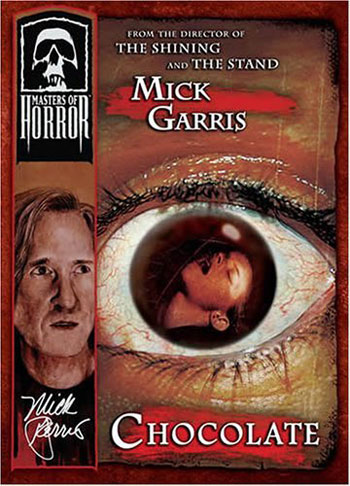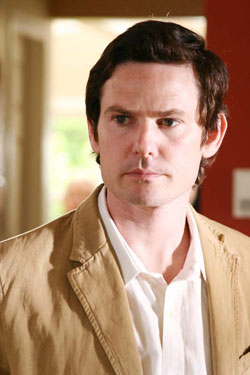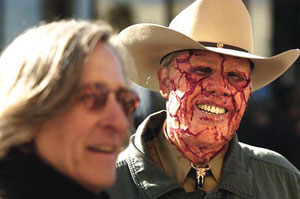 Mick Garris has been known as ‘The Guy Who Adapts Stephen King Stuff,’ and while that isn’t the worst niche to have to yourself, it’s probably nice for him to get a chance to spread his wings a little bit as the creator and mastermind of Masters of Horror, the anthology show that airs on Showtime. The first season was a success, and they’re gearing up to film the second season. In the meantime, the DVDs of the first season are hitting stores now.
Mick Garris has been known as ‘The Guy Who Adapts Stephen King Stuff,’ and while that isn’t the worst niche to have to yourself, it’s probably nice for him to get a chance to spread his wings a little bit as the creator and mastermind of Masters of Horror, the anthology show that airs on Showtime. The first season was a success, and they’re gearing up to film the second season. In the meantime, the DVDs of the first season are hitting stores now.
Chocolate is Mick’s entry in the series, and it stars Henry Thomas in an erotically charged supernatural story. Yes, Elliott from ET is in something erotically charged. Leave it up to Mick Garris to show him touching someone else’s heartlight, if you get what I mean.
Chocolate is in stores Tuesday the 9th of May (or tomorrow), and you can order it from CHUD.com by clicking right here, where you can also order John Carpenter’s entry, Cigarette Burns, Stuart Gordon’s episode, Dreams in the Witch House, and Don Coscarelli’s Incident On and Off a Mountain Road. More episodes are coming in the future.
Mick also has Desperation, based on the Stephen King novel, coming to ABC this May, as well as a couple of other things up his sleeves, which we’ll talk about in the interview. But first I wanted to ask him about a topic that had been bugging me for some months when it came to Masters of Horror….
Q: I want to start with a controversial topic, which is Imprint, the Takashi Miike episode.
Garris: What a surprise!
Q: I had written a strongly-worded editorial at the time when the decision was made to not show the episode. I want to ask you – do you think that situation has cost Masters of Horror some level of credibility?
Garris: No, because what we did was give him carte blanche to make the film he wanted to make, and he did. Showtime chose not to show it. Have you seen it?
Q: I have not seen it.
Garris: It is really intense.
Q: I have a friend who has seen it who told me, ‘OK, now I know where Showtime is coming from.’
Garris: Exactly. I have no beef with Showtime. As far as the fans go, what’s the big deal? You see it on DVD and watch whenever you like. Yes, it’s disappointing to us that it’s not running as one of the thirteen on Showtime, but the DVD will be there and it will not be edited or censored in any way. To Showtime’s credit, they said, ‘It is what it is and we’re not going to suggest changes to let it go on; we’re not going to tamper with it.’ And we certainly didn’t want to tamper with it. I don’t see how it could affect our credibility – we’re the ones who commissioned him to make the movie.
 Q: How does this impact season two? Does this create a situation where when you’re bringing people on board there’s the thought that things might be judged as going too far?
Q: How does this impact season two? Does this create a situation where when you’re bringing people on board there’s the thought that things might be judged as going too far?
Garris: No. I think it really was a cultural thing. I think there are different standards in Asian nations than there are in the US, especially on television in the wake of Janet Jackson’s tit. That really created a lot of trouble for broadcasters including pay cable because we have this unbelievably repressive and nasty administration in control of the choices we make.
Q: When is Imprint going to be on DVD?
Garris: It’s the last of the thirteen to come out. I’m not sure when that is, I think that’s sometime in the fall.
Q: Your DVD is coming out this week – these DVDs are packed.
Garris: They are. Other than the illustrations of the directors on the front, I could not be happier with the job Anchor Bay has done. Not many of those illustrations are good representations of the filmmakers, and I can certainly speak from experience. I’m not going to have to worry about being recognized on the street from the cover of Chocolate.
Q: Is this your first time having a trading card?
Garris: It is, by golly. And it may be the last.
Q: Was the plan always to have these DVDs be so packed?
Garris: The company that owns Anchor Bay, IDT, is the company that bankrolled the show. Showtime is our partner, but they basically licensed the right to show the program, whereas IDT has financed it 100%. They always intended it to be the jewel in their crown, and they always wanted it to be the most supplemental material possible without it just seeming like puff pieces and EPK material and all that. Just genuine well-researched, well put together supplements that the fans will appreciate. It’s why I think people will now understand why they did one show per disc rather than double them up. I know there was a lot of outrage at them coming out at that price, but when you get one of the Master’s movies and two or three hours of supplemental material and the script and source material, short stories and things they might be based on all on one disc, and you pick it up at Wal-Mart for ten bucks – that’s not a bad deal.
Q: Speaking of source material, I was struck with the thought that Chocolate would make a great novel.
Garris: Interestingly it’s in my first book, A Life in the Cinema. The short story and the feature script that I wrote over twenty years ago. The short story was first published in Hot Blood, the collection. I always wanted to turn it into a screenplay, and we got it close to a feature film over the years.
But originally I was going to do something much more horrific in nature, an adaptation of a short story I had written which was the title story of that collection, A Life in the Cinema. It’s a very extreme, splattery story about a mutant baby and a filmmaker who uses it as his key to returning to Hollywood. But I found that impossible to adapt. As we talked about at the time with the other producers and the like, [Chocolate] isn’t as filled with the tropes of horror – monsters and goosh and all those things – that people may think of with horror, so I know a lot of real intense horror fans were disappointed with it, because it’s not what you would expect from a horror film.
Q: I think it offered a nice counterpoint to some of the other episodes.
Garris: That’s what we thought. We wanted to define horror as broadly as possible, and in contrast to what most TV series do, we wanted each of these films to have their own identities and reflect the identities of the filmmakers and to be as unalike as possible. A show like Tales from the Crypt – great production values, great shows for the most part – but they all looked and acted alike.
Q: Wasn’t George Romero supposed to be doing one of the first season episodes?
Garris: He was. He was committed to doing it, but all the things going on with Land of the Dead and his life at that time got way too hectic. We’re trying to get him back for the second one, but I don’t know if any of the things he’s dealing with have been sorted out yet. I keep bothering him about it – I keep being a noodge.
Q: The second season, last I heard, you still had three open slots?
Garris: Officially, yes. We’re talking to some people and we’re trying to figure out if there is going to be another Asian one. There are a couple of things that we thought we had locked in, but as we feared might happen schedules conflicted and we weren’t able to close them.
Q: That’s got to be the tough part of this show – you’re working with people who could be making feature films instead, and they’re taking a month to do this fun thing. How hard is that to make it work out?
Garris: That is the hardest thing. It’s about a month to six weeks commitment, and everybody who contracts to do one of these has an out if they have a feature film project come together. That happened a couple of times on the first season, including George with Land of the Dead. So far it hasn’t affected the second season, but it has complicated things. Guillermo [del Toro] was going to do one but he can’t because they’re constantly throwing giant studio films at him. Various other people – Rob Zombie was going to do one, but his tour looks like it’s going to go through Halloween and we shoot up to October and then that’s our season. Other than shifting people’s schedules we can’t schedule around a filmmaker because once we start we don’t stop until we finish shooting all of the episodes.
come together. That happened a couple of times on the first season, including George with Land of the Dead. So far it hasn’t affected the second season, but it has complicated things. Guillermo [del Toro] was going to do one but he can’t because they’re constantly throwing giant studio films at him. Various other people – Rob Zombie was going to do one, but his tour looks like it’s going to go through Halloween and we shoot up to October and then that’s our season. Other than shifting people’s schedules we can’t schedule around a filmmaker because once we start we don’t stop until we finish shooting all of the episodes.
Q: Let’s just assume for the sake of argument that Showtime doesn’t want to bring the show back for a third season – is it possible that Masters of Horror might live on as a direct to DVD series?
Garris: It is possible. In fact, we would have done it even if Showtime hadn’t signed on. We pitched it to the only two networks that were viable for us because of the edict I had laid down when I created the show, which was that there would be no commercials and no censorship. The only we could have done this show was to do it with an HBO or a Showtime. We met with both of them and I expected HBO, who has very snooty tastes, to not be interested at all – and they like to own everything. They were very interested, though, and they pursued it for a number of weeks. But since it’s financed by a DVD company they couldn’t have all the international and ancillary markets that’s important to t hem. Showtime always was the right home for it.
There’s no reason to believe there won’t be a third season with Showtime. Even though they don’t put a lot of promotion into the show because it’s not owned by them – shows like Weeds or Barbershop they put a lot into – but I believe we’re their second highest rated series.
Q: Even though they’re not promoting it, the show has a lot of visibility.
Garris: Our genre is a very loyal and enthusiastic genre. I know for sure that thousands of people signed up to Showtime to get Masters of Horror. I don’t know of anyone who signed up to get Weeds.
Q: I don’t think the stoners who are the Weeds target audience have the wherewithal to actually get around to signing up. They’re too stoned.
This May Desperation is finally going to air.
Garris: It is. May 23rd.
Q: What took so long?
Garris: It was always intended to be a May sweeps movie. We could have accelerated it – we finished it last June. We could have accelerated it, maybe, to do it last May, but they had spent all of their promotional budget on Desperate Housewives and Lost in the preceding January. It’s a good thing we didn’t do it last May because it would have been no promotion. All of my King stuff has aired in May, and they’re very enthusiastic about this.
Q: Desperation is one of the King books that has a lot of hints towards the Dark Tower. Were you able to keep some of that stuff in there?
Garris: Oh yeah. Oh yeah! There are definitely references to Dark Tower things- the can-tois, and a lot of the dialogue is there for the fans to get. There’s not a whole lot of pointing at them with searchlights, but the people who have read the books will get the references.
King wrote this as a feature script back in 1998, and New Line was going to do it as a 35 million dollar picture, which at that time for a balls to the wall horror picture was pretty exceptional. But this was in the days of Scream and the like, and they decided that the only horror people wanted was teenagers winking and nudging each other about horror and not a serious scare ride. So we came close to making it as a feature several times, and ABC came to us and said, we want to do it. Basically it’s the script King wrote with very few alterations – just for format with the act breaks and things like that, where I did a few bits of revision here and there, and I did a few dialogue revisions to bring it up to date. But it’s the script he wrote, and I truly believe, had this been released theatrically, it would have gotten an R rating. It’s pretty intense. And they haven’t changed a thing.
Q: Has there been any discussion of doing The Regulators, the mirror novel to this?
Garris: I don’t think it’s as cinematic. Somebody might be able to find a way to tell that as a movie, but I think it’s so internal and so intentionally splintered and fractured in its telling it would be much harder to represent in the linear storytelling way that film would require.
Q: Speaking of Stephen King, why haven’t we seen a Masters of Horror from him yet? I count myself as a Maximum Overdrive fan – I would be interested in seeing him get in the director’s chair again.
Garris: I would love him to. Before his accident he was thinking about directing again and after his accident put that on hold for a while. Even though he’s in very good health now it’s  going to take a while to ramp up to that. I’ve asked him to direct, he’s just not ready to do that at this point.
going to take a while to ramp up to that. I’ve asked him to direct, he’s just not ready to do that at this point.
As for King material, it’s all for now dedicated to Nightmares and Dreamscapes.
Q: Now you’re not going to be involved with that?
Garris: I was the first one asked to write and direct one, and I did write a script, but they were shooting in Australia when we got word about season two and I needed to be here in LA to help develop and move season two along. I wrote one, we didn’t make, and if they do more of them I hope to be able to do one – it was one that they were excited about doing and I was excited about doing. And it was a zombie story! Home Delivery. It’s a great story, and the script is fun and very faithful to it, with some twists and turns here and there. I hope I get to do it; I’ve shot in Australia before and I love shooting there and just being there.
But May this year is an unbelievably busy time – not only is Masters of Horror shooting its second season and Chocolate coming out on the ninth, and Desperation on the 23rd, in the beginning of June my novel comes out. It’s a crazy time.
Q: What’s the novel about?
Garris: It’s called Development Hell, and the first two chapters were derived from a couple of stories in A Life in the Cinema. Basically it’s an extreme erotic horror novel disguised as a Hollywood satire. Or vice versa.
Q: One of the complaints some people had about the first season of Masters of Horror was that they felt too many of the episodes leaned to the comedic. Are we going to see that again or will we see more straight horror?
Garris: Well, it depends on who the director was. It reflects the director’s sensibilities. One thing that happens when you tell people that this is uncensored and they can do whatever they want, there’s a lot of sex in there. Including in my own. At a certain point after watching a bunch, you’re like ‘I think I’ve seen enough of that for a while.’
There was humor in some of them, but Tobe’s was really straightforward and dark and apocalyptic. But probably less so in the next one – but you know, you get John Landis, you’re gonna get humor. You get Joe Dante, you’re gonna get humor.
There was one that I wrote for this season as a reaction to the whole ‘Not enough true suspenseful horror’ complaint called The V Word, which Ernest Dickerson is going to direct, and Michael Ironside will be in, that is a really strong – well, you can imagine what the V word might be in a horror series.
Q: And your episode this next season is a Clive Barker story?
Garris: It’s an original treatment he wrote for the show. It’s very dark and very erotic in a twisted way, but much more horrific than Chocolate was. It really goes into some very dark places – there’s a demon, and it’s sort of a ghost story that ends up being more bizarre than that.